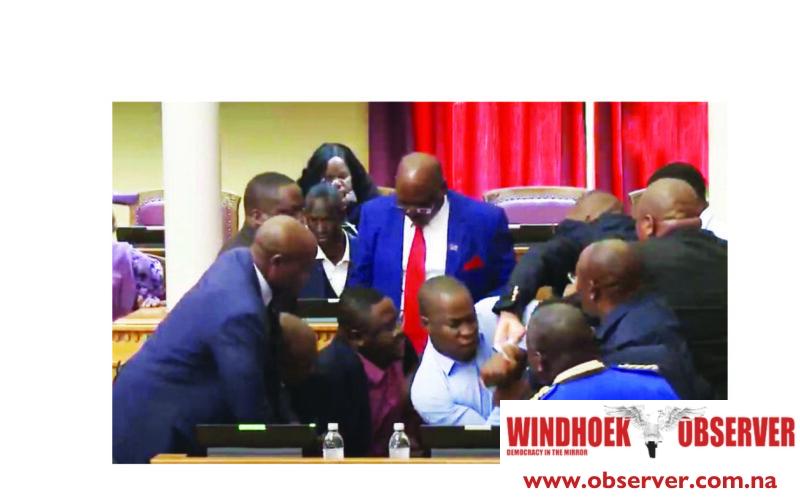Allexer Namundjembo
The National Assembly descended into chaos on Thursday after Affirmative Repositioning (AR) parliamentarian Tuhafeni Kalola was forcibly removed from the chamber on the orders of speaker Saara Kuugongelwa-Amadhila.
Kalola was escorted out by parliamentary security after refusing to take his seat when instructed by Kuugongelwa-Amadhila.
He had attempted to raise a point of privilege without recognition, sparking a heated standoff that escalated into physical confrontation.
“I insisted that I should be given that privilege to ask for a point of privilege. It is common, and every member of parliament ought to be given that right,” Kalola said afterwards, condemning his removal as unlawful and heavy-handed. He confirmed that he would later be hospitalised due to injuries sustained during the altercation.
The incident quickly drew in AR leader Job Amupanda, who attempted to intervene as security officers moved Kalola out of the chamber.
The confrontation disrupted proceedings, leaving the National Assembly in disarray and unable to resume its scheduled business.
Amupanda blamed the scenes on what he called “parliamentary incompetence and revenge tactics”.
He claimed the speaker’s actions were influenced by frustration over a recent AR press conference that criticised Parliament’s management and her leadership.
Kuugongelwa-Amadhila defended her decision, saying Kalola defied parliamentary rules by addressing the chamber without authorisation.
“The conduct of AR members has been consistently unruly during sessions, and order must be maintained,” she said.
The clash highlighted tensions between the ruling establishment and newer opposition forces.
Presiding officers argue that strict enforcement of rules is necessary to maintain decorum, while opposition MPs say such measures are increasingly used to silence dissent.
In a press release after the session was adjourned, AR condemned the speaker’s handling of the session.
“Albeit long overdue, this regrettable incident resulted from the speaker’s modus operandi of putting the rules that guide the house aside and using her emotions to preside over the house. This is a deep manifestation of how the ruling elites would do anything to silence radical minds,” the statement read.
The movement said there was no justification for removing Kalola for attempting to raise a point of privilege.
“It is not rational to brutally remove our members from the chambers simply because there is an agenda of isolating them as an attempt to silence them,” AR stated.
The party accused the speaker of shielding members of the executive from accountability.
“We are advising the presiding officer to embrace the superior logic that our activists bring into the house and allow debates that expose the failure of the post-independence state. We are warning against suffocating the downtrodden voices that want to speak openly through democratic institutions because when the space is closed, our people will have no other opportunity but to use other means necessary to fight for their liberation and hold the corrupt, incompetent ruling elites accountable,” the statement said.
The National Assembly secretariat said on Thursday evening that Kalola and Amupanda were ejected after disorderly conduct and breaches of parliamentary rules.
The secretariat said Kuugongelwa-Amadhila invoked provisions of the standing rules and orders to restore order.
According to her office, Kalola refused to comply when instructed to remove his cap and resume his seat, in violation of rule 103 on wilful disobedience.
“The speaker then ordered him out of the chamber under rule 104(1) and 106(1). When he resisted, parliamentary security was called to enforce the ruling. Amupanda was also removed after allegedly intervening physically, obstructing the process, and further violating rules through his dress code, use of a cell phone, and unparliamentary language,” the statement said.
The National Assembly said Kuugongelwa-Amadhila acted within her authority to preserve decorum.
“In light of the escalating disorder, and as provided for under rule 102, the speaker adjourned the House without putting the question in order to restore order and uphold the dignity of the National Assembly,” the statement read.
The Popular Democratic Movement (PDM) disagreed and condemned the handling of the incident.
The party argued that Kalola’s attempt to raise a point of order was mishandled and that his removal was undemocratic.
“The use of excessive force against a duly elected member of parliament is unacceptable, unnecessary, and unbecoming of a speaker tasked with safeguarding fairness in the House,” PDM said.
PDM accused Kuugongelwa-Amadhila of acting in a biased and partisan manner, undermining democratic debate.
PDM said parliament is meant to be a house of open discussion and accused the Speaker of procedural sabotage by failing to allow meaningful debate.
“We emphasise that we are not calling for unruliness, but for the voices of Members of Parliament to be heard and respected, and as the saying goes, ‘Let me have my say, and you can have your way,’” the statement read.
PDM called on the speaker to uphold impartiality and restore dignity to parliament, urging her to emulate the balance shown by her predecessor, Peter Katjavivi.
The latest disruption adds to a history of strained relations over parliamentary discipline.
In 2021, several opposition MPs were ejected during former president Hage Geingob’s State of the Nation Address (Sona).




